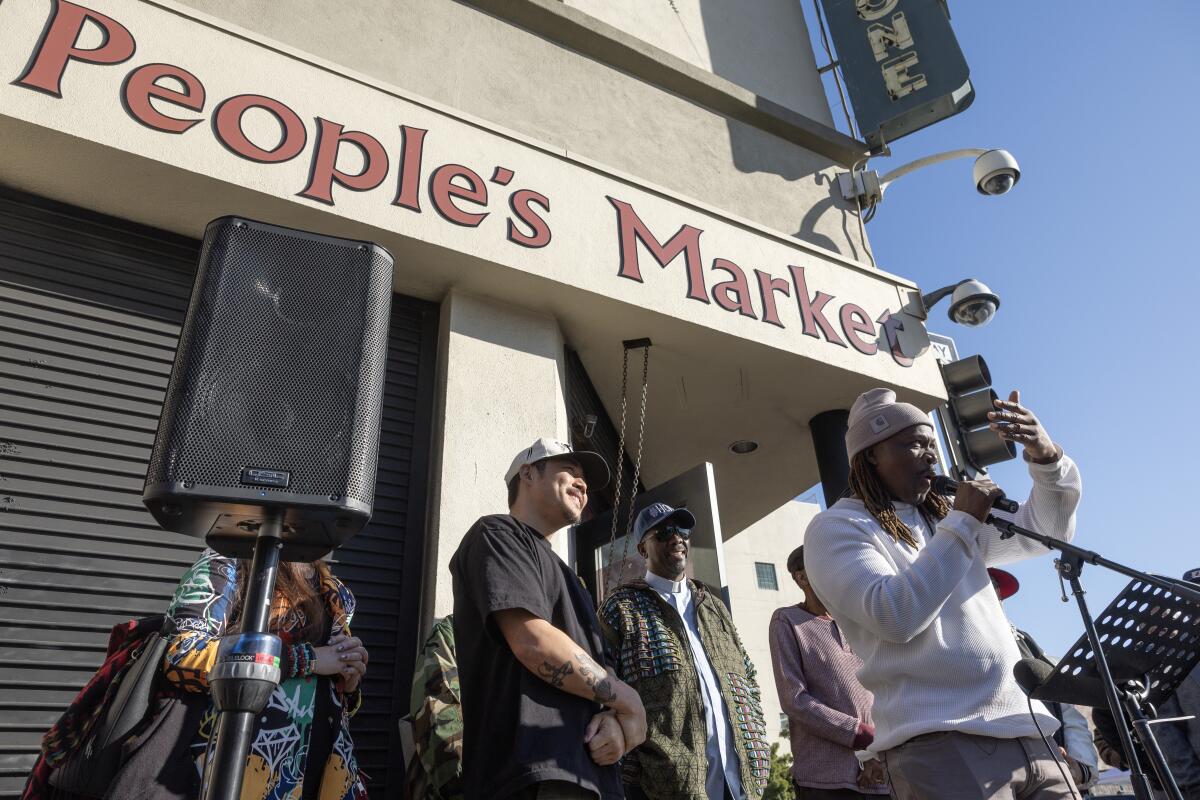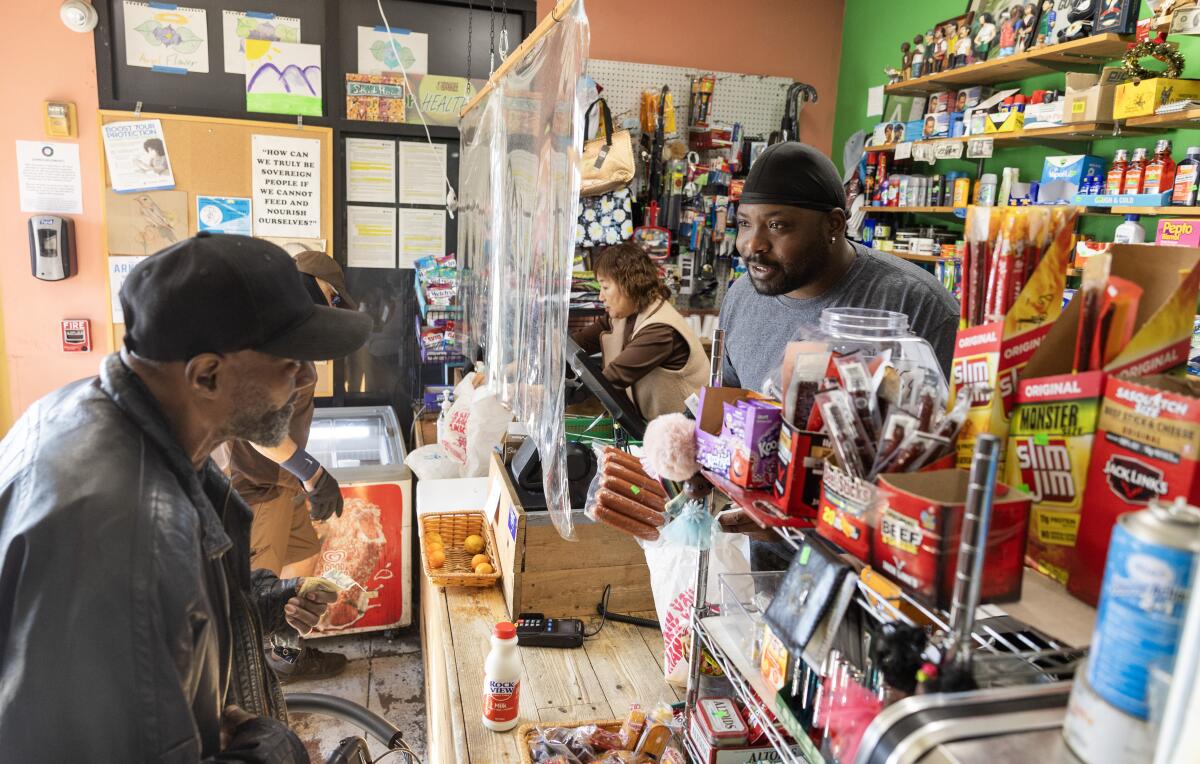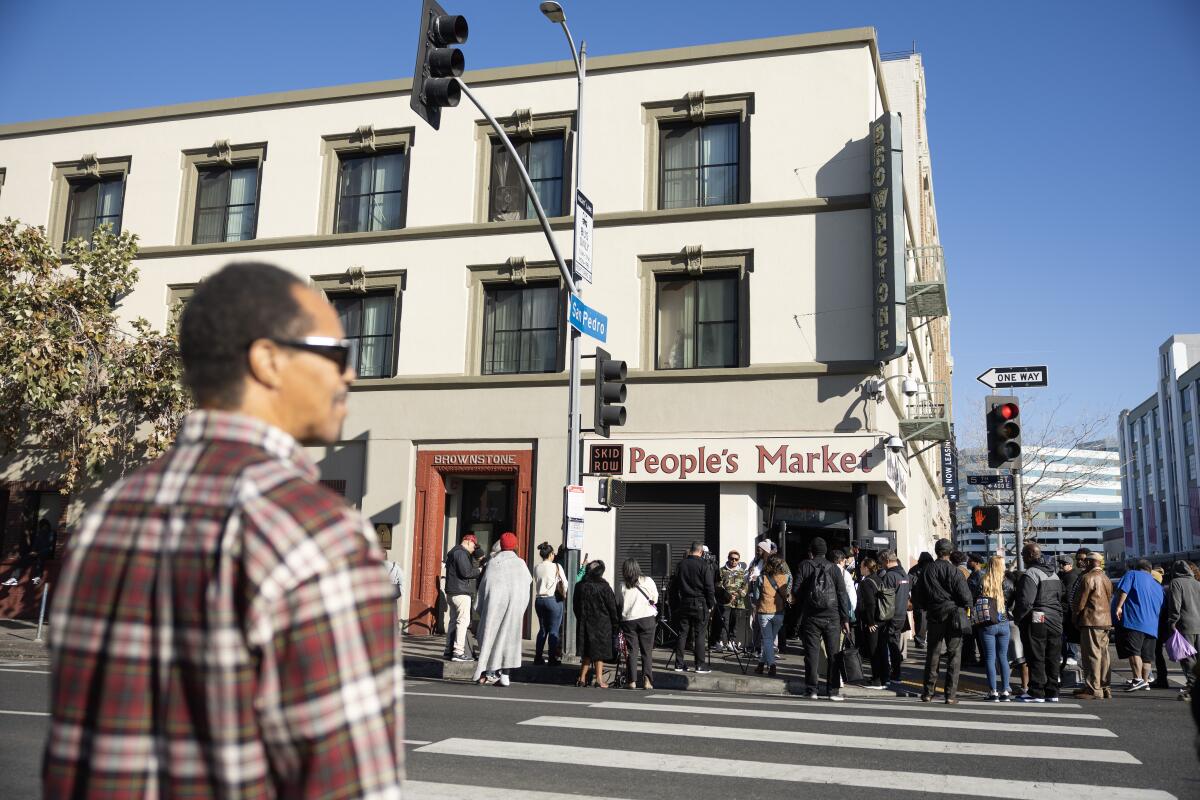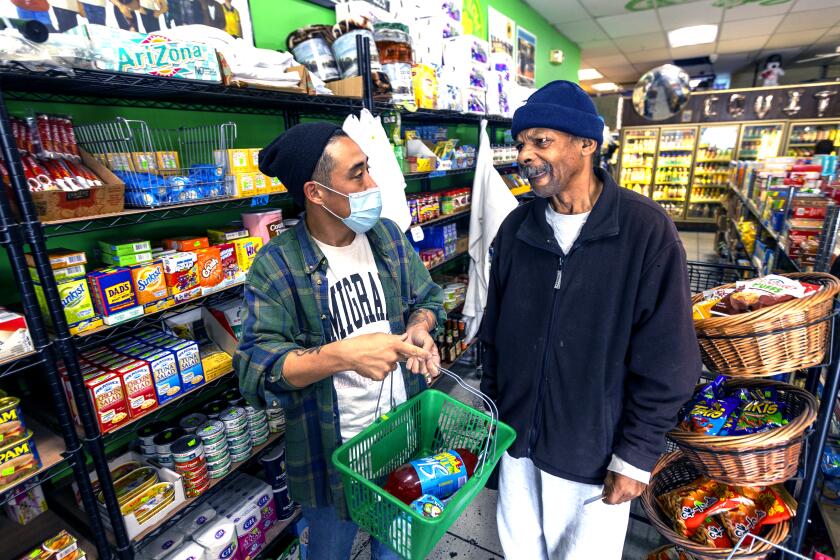Black-led nonprofit to take over Skid Row People’s Market, a longtime community hub

- Share via
On another busy day at the Skid Row People’s Market in downtown Los Angeles, workers stocked shelves while shoppers purchased sandwiches, fresh produce and fruit.
The store at 5th and San Pedro streets, kitty-corner from a wellness center and across from a women’s shelter, is a vital asset for this impoverished, Black and Latino neighborhood.
Danny Park, 39, who took over the business from his Korean immigrant parents in 2015, weaved social justice into its fabric by providing healthy and affordable food, giving store credit to customers low on cash and helping the unhoused population — the largest in any part of the city.
“I know it’s a corner market, but we try to help in all the ways that we can,” he said.

But operating the store has taken a toll on Park’s health, and now he wants to sell it, not to the highest bidder but to Creating Justice LA, a Black-led nonprofit serving Skid Row.
“We wanted this to be a generational thing where the store can continue to be a benefit for the community,” he said.
Pastor Stephen Cue Jn-Marie, founder of Creating Justice LA, said the goal is to expand on the services Park created, with input from Skid Row residents.
“We’re not going to put people out of a job,” Jn-Marie said. “Whatever benefits the community, then that’s what we’re going to do.”
Park and Jn-Marie said it may take up to three months before the change of ownership is official.
The significance of selling a Korean American-owned store to a Black-led nonprofit isn’t lost on Park and Jn-Marie. They say it’s another step toward healing from the Korean-Black conflicts of the early 1990s.
Danny Park, owner of Skid Row People’s Market, wants the store just south of Little Tokyo to be more than its inventory.
Back then, many liquor stores in South Los Angeles were owned by Korean immigrants, who had often acquired them from Jewish shop owners leaving South L.A. as it underwent enormous social and economic changes — the loss of industrial jobs, a crack epidemic, gang violence, police brutality.
Cultural misunderstandings created friction, with some Black patrons believing that the Korean merchants were exploiting them and stealing business opportunities.
Tensions rose on March 16, 1991, when 15-year-old Latasha Harlins entered the Empire Liquor Market Deli in South L.A. and placed a $1.79 bottle of orange juice in her bag. Latasha, who had $2 in her hand, intended to pay at the register, but Soon Ja Du, the store owner, accused the teen of trying to steal the juice. After a scuffle, Du fatally shot Latasha, who was walking away.
Police later confirmed that Latasha had not been shoplifting. Du was found guilty of voluntary manslaughter but received probation rather than prison time.
Korean owners were hard hit during the 1992 riots, losing more than 2,000 stores and suffering more than $400 million in losses, according to a 2002 UC Riverside study. Some manned the rooftops with guns, ready to defend their businesses.
In 1995, May and Bob Park took over the lease of the Best Market in Skid Row.
May Park, 68, said there were rarely any problems at the store, attributing that to the respect she gave customers.
When Bob Park died in 2018, Danny Park was already running the store. He changed its name to Skid Row All People’s Market, hoping that it would empower residents and serve as a healing space.
Today, that mission is visible throughout the store. A hand-painted message in English and Korean reads: “A safe space for the Skid Row community to heal ourselves and develop healthy identities.” “Food is medicine not only for the body, but spiritual connection to history, ancestors and the land,” another message states underneath.
In the back, “Equity” is spelled out with silver balloons taped above beverage coolers.
Near the entrance, a framed photo of Latasha Harlins is part of a community altar. Leaflets and fliers for public services are pinned to a bulletin board near the register, beneath several drawings and paintings made by customers.
The store is one of the few in the area that offer fresh fruits and vegetables, also selling a little bit of everything, from portable stoves to underwear and tampons. EBT card holders get 50% off.
Park, who sits on the board of Creating Justice LA, said he started thinking about selling the store last year. He was struggling mentally and worried about his health after a close friend suffered a stroke. He said his father and uncles had died of similar causes.
“I think for a long time, I was personally in denial, but I’ve been struggling a lot,” he said. “I thought that if I let the market go or sold it, I would be letting the community down. But if I didn’t do that, then I would basically start getting sick.”
Park reached out to Jn-Marie, a mentor and big brother to him.

“He was tired. He was trying to do the right thing in the community and serve the community,” Jn-Marie said. “I imagine having to see the hardships of living on the streets and hearing everyone’s pain and what they’re going through. It takes a toll on you.”
Jn-Marie said he thought about purchasing the store but realized it would be a good addition to the nonprofit, which already had some experience running a co-op smoothie shop and a resource center.
On a Wednesday afternoon, 40-year-old Don Johnson came in to purchase some vegetables.
As he lifted a bag of vegetables from a straw basket, it ripped from underneath.
Mark Burton, 37, who was stocking shelves with cans of fish steaks, rushed over to help.
“Let me get you a bag,” Burton said.
“Good looking out, man,” Johnson replied.
Johnson has been shopping at the store for eight years. He said that he was saddened to hear it would be sold and that he would miss the owners.
“I love shopping here,” he said.
Burton said he hopes to continue working at the store. He said he knows just about everyone who walks in.
“I just hope the store stays the same or at least that we keep to our values,” he said.
Nearby, Solomon Hailenicael, 75, walked over to the register to pay for snacks.
“Where’s May?” he said with a raspy voice.
“Here, here,” May Park responded.
“I was wondering where you were. I’ve missed you.”
This is the only place that Hailenicael shops for groceries.
“They look after me here,” he said. “I can shop in peace.”
Hailenicael said he’s broken-hearted but he’ll keep coming back. He grabbed his bag and said goodbye to May Park.
More to Read
Sign up for Essential California
The most important California stories and recommendations in your inbox every morning.
You may occasionally receive promotional content from the Los Angeles Times.















